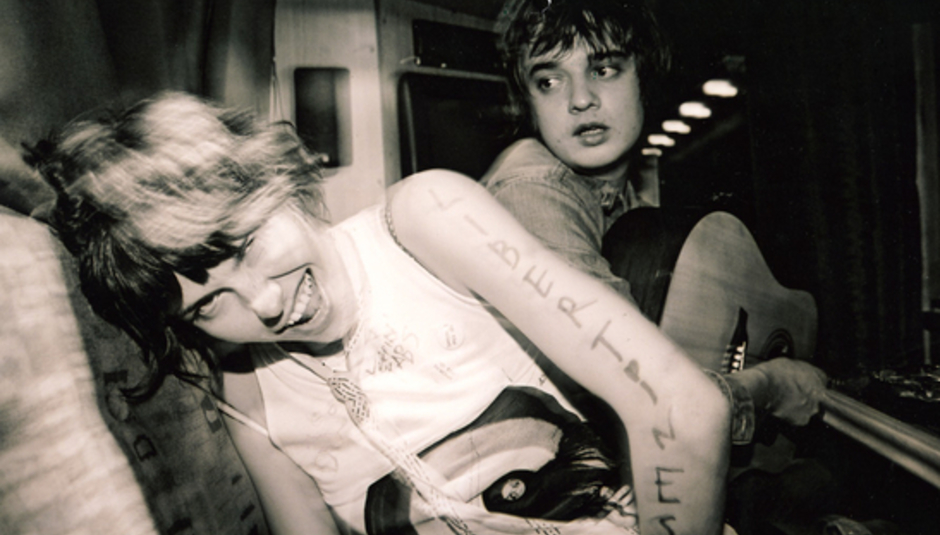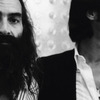Some of you may know Didz Hammond as the former bassist and unofficial spokesman for The Cooper Temple Clause, and many of you may be aware that when he departed the band, he joined Carl from The Libertines' band, Dirty Pretty Things. You may also have noticed he's writing for DiS again. So, we thought, who better to send along to review a new documentary about The Libertines than the man himself...
Now, first of all, let me say that this is a bit of a weird one for me.
DiS thought that it would be a good idea to dispatch me to review the new Libertines documentary, There Are No Innocent Bystanders. The production company is based out of a converted car-park in Shoreditch where I was plumped down into one of the many deck chairs that make up the seating in their screening room to drink beer and watch a film made by one of my closest friends and starring two others. I guess DiS' editor hoped that I could provide you all with a “unique take” on a rock’n’roll story that is so archetypal it may as well involve a Rolls Royce in a swimming pool and a rumour about the misappropriation of a Mars Bar...
The reason why this is all so odd for me is illustrated quite clearly in the middle of the film. Well, not illustrated as such, more as totally over exaggerated and distorted, courtesy of an unfortunate juxtaposition of images and the fact that when Carl was interviewed, mine seemed to be the only name he could remember out of everyone he had ever met who wasn’t in the Libertines and wasn’t their manager Banny Pootschi or James Endeacott (their A&R). Or Pete’s sister: Amy-Jo.
This is how it went: Carl was explaining about the period when he and Peter first started to drift apart. He says how, through his pride in their achievements, he, quite understandably, enjoyed meeting other people in the industry, other people in bands, communing with them (let’s euphemise it like that, ok?), hanging out and enjoying being a bit famous. Then Carl’s talking-head takes the frame and he says that his social life annoyed and alienated Peter somewhat and, it emerges, resulted in Peter turning to drugs in increasingly deep and more worrying ways. The problem being that, for some reason, my name was the only one dropped and, for about ten seconds there is a picture of me onscreen while the boys chatter on about the dark social elements of the music industry as emblemised, quite unjustly, by my face. So, there it is. Proof conclusive that it was me that split up the Libertines by occasionally going out with my friend Carl. Thanks Carl. Thanks Roger. Sorry kids.
This has been a spectre in my “relationship” with The Libertines (- more so for Rossomando but that’s his business and his story to tell. Which he won’t). It’s rarely spoken about to me directly, although there was an occasion in an Italian dressing room at about four in the afternoon where myself and the aforementioned Connecticutian were subject to some snidey but direct abuse vaguely on this subject from the well-known twat Dominic Masters from The Others (who had just finished berating his band, tour manager and the local promoter for not being able to get him “…SOME FUCKING DRUGS!”). But it’s always there a little bit. Y’know, that I’m not Peter Doherty. And it’s my fault that I am not. And certain people have the right to resent me for that err… shortcoming. And that it was some kind of grotesque gesture of treason or blasphemy for me to have ever considered playing in a band where sometimes Carl and I would share vocal duties. This is why this is a bit of a weird one for me but I suppose the shadowy overlords at DiS wanted to exploit that and what it entails, so here it is.
First of all, Roger Sargent has made a great film. The main narrative tracks the Libertines’ famous reunion for the Reading and Leeds Festivals in 2010 and the emotionally taxing build up to those shows. Tangents are taken from this main thread to tell the stories that make up the rise, decline and fall of the Libertines from 1997-ish to 2004 when they decreed an “extended sabbatical” and went off to do other shit. Let’s call these tangents 'the secondary narrative'. (I flirted with the idea of calling it the “diminutive narrative” but, despite being funny, that’s not really fair to anyone.) And it works. It works really nicely. Maybe I’m biased here, probably for reasons of my personal history and relationships with these people, but also because I love a rockumentary, cinematic or in print. I have been known to devour pop biographies in the same amount of time that it takes most people to negotiate a deep-pan pizza. Roger’s brilliant and extensive career as a music photographer has stood him in great stead here and he proves more than capable of making the jump from the static to the moving image, utilizing his own photography archive and some digital tricks to make them come alive on screen. The title sequence near the front of the film, featuring Messrs.’ Barat and Hassell through the rear view mirror of a taxi, is a particularly lovely echo of Pennebacker’s ‘No Direction Home’. And it’s not just the visual side that benefits from the director’s previous with the band. The interviews which tease out the band’s responses, are by turn hilarious and tragic, but nearly always honest (at least seemingly) and emotion is never far from the surface - a sequence near the end shows a solitary tear roll down Doherty’s cheek as he tells of one or other of the myriad of misunderstandings and perceived betrayals. Also, their easiness around the cameras that invade their time together is only possible because of who is filming them, another otherwise-ridiculous level of access achieved comfortably.
One of the things you should and perhaps already do know is that Roger was always there. He was always bloody there, click-click-clicking from behind his camera. His friendship with the band was forged extremely early in their rise and proved enduring enough to straddle the warring factions when the relationship between the two front men crumbled in a way that seemed irreparable. Look at any published photo of the Libertines and the credit will almost always be Sargent’s. Look at live footage and it’s his bald, bald head poking out from behind the amps. Click, click, click, click, clicking. He was always there because the band trusted him. And with Carl’s natural paranoia, and Peter’s narcotic psychosis, this was no mean feat. They trusted him because he was (and is) a very good friend and because he always made them look great (‘that’ Doherty teeth shot in the NME when they had their second cover was, notably, not his work). This ensured that his trust and access were pretty much total, his library ridiculously complete, his suggestion that he make this film at all almost impossible to refuse, even at a time when the four separate band members had four different managers, each trying to out-flank the others and take the biggest slice of, ahem, credit, ensuring four personal security guards and four different tour buses for what amounted to four UK gigs in total and a bit of rehearsing. (The band were kind of united at the core – more than they had been since 2003, really - but the fact that there were so many competitive cooks around them meant that the broth ended up being made from City-boy stock(s) and liquid gold. And some lamb. Sacrificial lamb, perhaps. Which was ridiculously indulgent and stupid but there you go. These people need their gaudy chandeliers to hang from the necks of their charges. How else would the glory be reflected off the band and on to them?) Roger was one of four or five people welcomed back into the fold the second time round and was certainly the only one to return with his responsibilities multiplied. With this being his first film and with no guarantee that the gigs would actually happen at all meant that he must have been shitting himself. But they did happen and the film’s great so it’s all alright. It’s all fiiiiine. Aside from a minor spat with Gary Powell that I saw on Facebook the other day due to a mix-up over an invite to a screening. The screening I went to. Unlucky Gal.
Anyway, yeah, Roger’s great. He’s done a great job that totally makes There Are No Innocent Bystanders a totally worthwhile artifact that he was very likely the best person to make. But let’s go into something hinted at just now when talking about the managers. Do we really need this film yet? Between the NME and the tabloids, anyone with eyes and ears knows the story. The tabloids (as I’m sure you remember) ran amok with Potty Pete stories, particularly in the period between the start of his courtship with the Anti-People’s Princess, “Cocaine” Kate Moss and, later, when the red-tops saw the opportunity to make Miss Winehouse a bigger story, if not one with tragically similar plotlines and agendas. The NME, basically, took care of the rest: Carl’s torment, the prison months, album two, Peter-less touring, Alan McGee, Babyshambles, rah-de-rah-de-rah….we know aaaaaaall about it and there’s no way that enough time has elapsed for it to have even slightly slipped our memories. Not considering the way it was forced into our retinas from all angles back then. Given, as I mentioned earlier, that it is a story that basically could have been molded in a rock’n’roll yarn cake-tin, it’s a wonder that those of us with kids aren’t telling it to them around the fire on chilly nights as warning of what not to do if your band gets big. This in mind, is it too soon to regress? Is it a symptom of “indie” taking itself too seriously that films are made in a premature effort to immortalise the band-in-question’s legacy? To be fair, I’m not seeing Scorsese lobbying anyone at Wiiija to let him make a Blood Sausage biopic. There has to be a certain demand and, bearing in mind that this DVD release and its associated events are being paid for by a massively successful Pledge campaign, there is significant evidence to suggest there is. (The Doherty-charging-for-gigs-in-his-front-room parallels being brilliantly appropriate – bravo the fans and, in turn, bravo the band.) We can moan and moan about the original magic being compromised (even when the subjects may have never even been close to going on “an extended sabbatical”) by peripheral documents that are seemingly surplus to requirements, but, at the end of the day we all know that the arse has fallen out of record market (unless you’re Adele) and that for artists we love to continue making the music we love the finances increasingly have to come from other sources. From diversification. Which you could view as mercenary, but also, you could view it as a different kind of creativity. Maybe creativity is too strong-a-term but, y’know, generally artists are doing what they can to make an honest buck and, in my experience, it’s largely to preserve their chances of making more music. Viewed cynically, this can be put down to the artist’s narcissistic need for the spotlight, but that’s always been there (almost always necessarily), no matter what the available media outlets. You can make that criticism of the idiot who takes the stage at your local pub to sing his sub-Starsailor whimsy-shit on a Wednesday night. You can make it of Jagger when he first got up and played harmonica with Big Bill Bronzy. When George fucking Formby entertained demobilized troops after the Second World War. I haven’t been raised to think this, and I’m not sure I do, but maybe Jesus had that need at the Sermon on the Mount. This is a brilliant film and there are many other brilliant films about rock bands. And the storyline (though pretty recent) is at once compelling and cautionary. Just because it’s one of many, many music films and part of a trend for them to be about younger bands, that doesn’t invalidate it. It would if it was about, say, The Pattern (and I love The Pattern, indeed many patterns); I mean, who wants to hear that story?
Ok, so what if this had happened: What if Robbie Robertson’s trousers had split near the start of ‘The Last Waltz’ and he hadn’t noticed and his bum was out all over the place and he slipped on the shore of Clapton’s smack-withdrawal sweat puddles as they slowly seeped across the stage making it treacherous underfoot if you weren’t paying attention and he fell over and hurt himself and looked like some moustachioed idiot embarrassing a load of legends? What would have happened? What would have happened is that ‘The Last Waltz’ would never have made it to your screens but does that mean that it was wrong to have the cameras rolling in the first place? If you think a story’s probably worth telling then you may as well try and record it for posterity. More than this, if it does turn out to be worth telling; it’s worth telling well, and here it is told very, very well.
A parting thought: There seems to me, to be two categories of music films – good and bad. The example that occurs to me, which illustrates the low-end, is how HMV et al used to cheaply commission, print and sell rubbish band biographies in the nineties, putting them on the stands at point-of-sale. You may well have bought one of these instead of a five pack of TDK C-90’s. Maybe you had finished that week’s copy of Select and needed something to read during the bus ride home. We have to assume here that the sleeve notes of whatever Martha Reeves or Gay Dad or New York Dolls compendium you’d just bought were not fit to satiate your appetite for a print accompaniment to your on-the-move audio treats supplied courtesy of a Sony Walkman. The point is, that I doubt that these casual dalliances even put as much as a dirty look towards the sales of “Hammer Of The Gods” or “England’s Dreaming” (personal favourite: John Harris' "The Last Party"). What were, essentially,soft backed pamphlets didn’t even approach the significance of those mighty and respected tomes. They were only slightly more significant than soft Word-Of-The-Day Toilet Paper. You probably wouldn’t remember them, let alone quote them. But this film is significant. In terms of the Libertines, this is the document that Dylan and Pennebaker would have implored you to eat. This is a film to be quoted. Both in terms of facts and (probably more tellingly) dialogue, which is, by turn, funny, tragic and cuttingly insightful.
There Are No Innocent Bystanders is release on DVD on April 30.
A limited number of screenings will take place on the following dates:
April 25th: O2 Academy Liverpool
April 27th: O2 Academy Birmingham 2
April 27th: O2 ABC Glasgow
May 2nd: O2 Academy Islington
May 4th: O2 Academy Bristol
May 5th: O2 Academy Newcastle






















